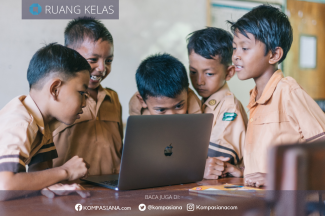The Tut Wuri Handayani principle is one of the principles of national education coined by Ki Hajar Dewantara, the father of Indonesian education. This principle comes from Javanese which means "behind giving encouragement". This principle means that an educator, teacher, or counselor must be a driver, motivator, and facilitator for students to develop their own abilities and interests. An educator must not control or coerce students but must give students freedom and independence to learn in accordance with their natural, cultural, national, and human nature.
According to the Tut Wuri Handayani principle, there are several things that an educator must do, namely:
- Education is carried out without using coercive conditions, but by respecting the rights and obligations of students.
- Education contains the meaning of momong, among, and ngemong. Momong means observing students so they can grow according to their nature. Among means developing the natural nature of students with the requirement that they can develop their inner life to be fertile and safe. Ngemong means following what students want to do and providing help when they need it.
- Education creates order and peace (orde en vrede) in the learning environment.
- Education does not spoil (ngujo) students but provides challenges and opportunities in accordance with their abilities and potential.
- Education creates a climate that is not governed but governs oneself and stands on its own feet (independent in students).
The Tut Wuri Handayani principle is a relevant and important principle to be applied in the world of education today. With this principle, it is hoped that students can become people who are faithful, knowledgeable, virtuous, and responsible.
The author has implemented the Tut Wuri Handayani principles when implementing PPL teaching assistance at SMAN 2 Babelan such as:
- At every meeting there is always a demand to understand English both spoken and written, and to help students if they need it.
- When class starts there are rules about bringing a dictionary for every English lesson, it is forbidden to bring colored drinks, and at every meeting there is always an assignment so that students can understand English more quickly.
- When giving English language lessons a challenge, always use their abilities and potential, using basic words that are familiar to them.
- Using the "inquiry-based learning" learning method, by inviting students to find answers to the questions that have been prepared. You can open a dictionary or ask questions to your group friends.
The researcher concluded that the teachers of SMAN 2 Babelan had actively implemented the principles of Tut Wuri Handayani, such as the demand to understand English in speech and writing, the existence of rules that must be followed by the students, giving challenges in every meeting, and using the “inquiry-based learning” method, from the principles such as momong, among, ngemong, orde en vrede, ngujo, and self-reliance in the students.
Follow Instagram @kompasianacom juga Tiktok @kompasiana biar nggak ketinggalan event seru komunitas dan tips dapat cuan dari Kompasiana
Baca juga cerita inspiratif langsung dari smartphone kamu dengan bergabung di WhatsApp Channel Kompasiana di SINI
